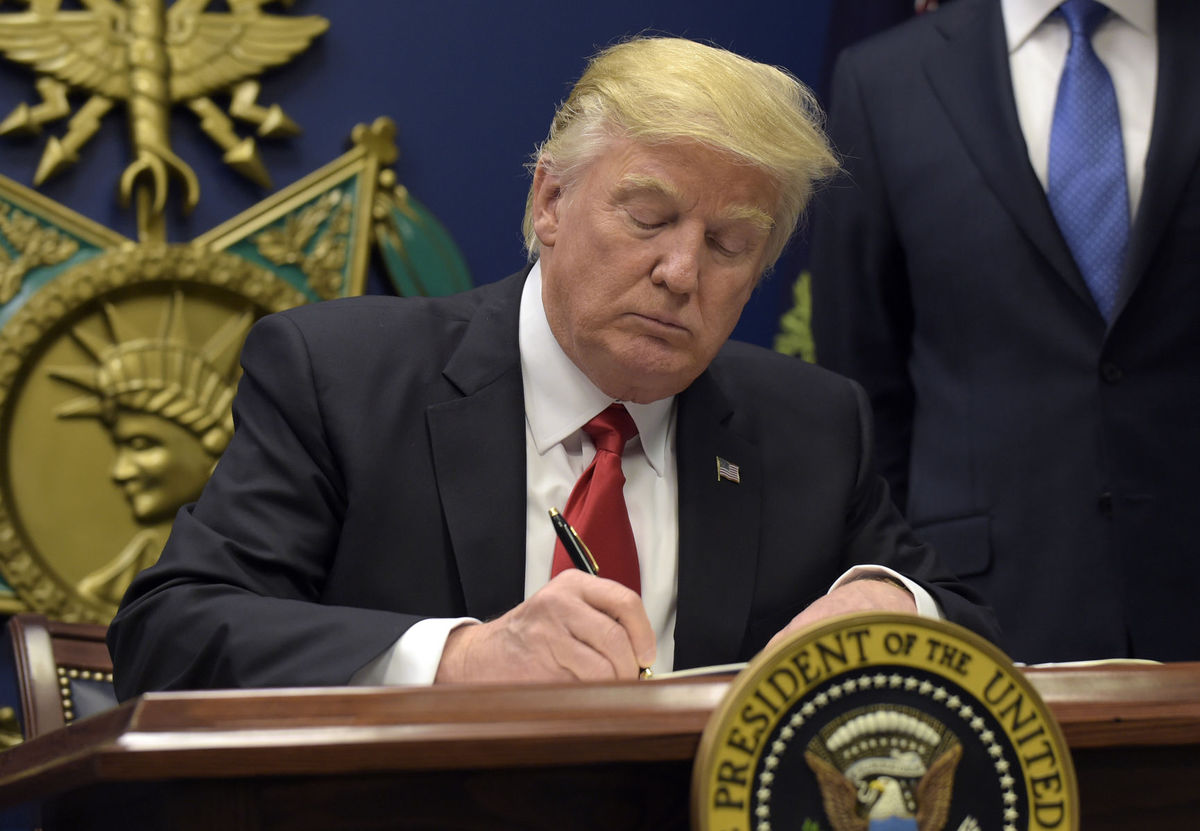
President Trump signing his first executive order on immigration in January, temporarily barring people from seven predominantly Muslim countries from entering the United States. (Susan Walsh/Associated Press)
UPDATE December 4, 2017: On Monday, the Supreme Court decided it will allow the Trump administration's travel ban on six Muslim-majority countries to be fully enforced. But colleges says the ban is now so watered down that few students will be affected.
After Trump signed his first executive order on immigration back in January, barring people from seven predominantly Muslim countries from entering the United States, colleges took precautions.
Administrators advised current students from those countries to stay here and they reached out to potential students, telling them they are still welcome.
Now, since the Trump administration announced exceptions would be made for travelers with documented family and educational links in the US, colleges, including Boston University, say they don't expect any effect on admissions or their institutions from the Supreme Court's order.
Still, the American Council on Education, which represents hundreds of colleges and universities in Washington, says the Trump administration's rhetoric and ambitions could have long-term consequences on schools' ability to attract students and faculty.
This story originally aired on WGBH News in March, 2017.
President Trump's updated executive order, the one restricting travel from six Muslim-majority countries, is blocked for now. But administrators at Northeastern University in Boston aren't taking any chances.
"We're in a state of limbo," says Mike Armini, who oversees government relations. "We don't quite know what's going to happen next, so we've advised them to stay here," he says, talking about the 250 Northeastern students from those six countries.
While those students stay put, Armini and his colleagues worry that potential students, who are receiving their college acceptance letters, will decide not to come to the U.S. Right now, international students represent about 20 percent of Northeastern's campus.
"Even if you're not from one of those six countries, there's a sort of chilling effect that we're very concerned about." So he and other administrators are reaching out, telling possible students they're welcome.
"We feel that something is lost if you have certain countries not represented on your campus," he says.
But there's also the bottom line. A recent survey shows students from those six countries alone bring in more than $500 million to the U.S. economy each year.
If Northeastern, and other schools, admit students who are later blocked from the country, universities could lose a lot.
"Our institutions are very concerned," says Melanie Gottlieb, deputy director with the American Association of Collegiate Registrars and Admissions Officers, which surveyed nearly 300 colleges to understand the early effects of President Trump's immigration policies.
Four in 10 of the colleges that responded say they have seen a drop in applications from around the globe. Nearly 80 percent expressed concerns about application yield.
"There are concerns that the rules might change," Gottlieb says, adding that students are still applying to American colleges and universities — 60 percent of responding schools say they haven't seen a drop in international applications this year.
But she adds that she has seen students hedging their bets, "also applying to places like Canada, the U.K., Australia and New Zealand." And in the survey, schools expressed a fear of losing students to other English-speaking countries.
But it seems, schools in those countries haven't missed a beat.
In Canada, the government is providing millions of dollars to attract the best and brightest scientists and innovators from around the world.
"The international market is very lively. It's very competitive," says Bruce Dowton, president of Macquarie University in Sydney, Australia, which enrolls more than 12,000 foreign students from 130 countries — about a quarter of its total enrollment.
Dowton says there has been a 30 percent uptick in international applications since Trump's election.
"We certainly look to provide an attractive offering for students to come to Macquarie, and I know other university presidents around Australia see it the same way," Dowton says.
While Macquarie is boosting its recruitment efforts abroad, it is still too early to know whether what happens in the U.S. will drive up enrollment Down Under.
Earlier: How Trump's Rhetoric Could Cost Colleges Billions In Lost Tuition Revenue










